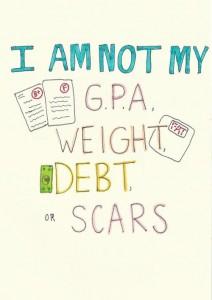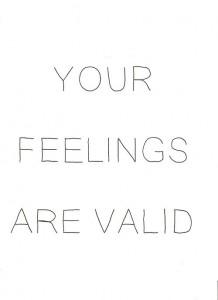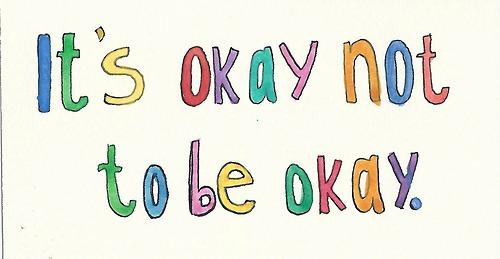[Content note: depression]
People struggling with mental illness (or any sort of illness, or anything crappy, really) are constantly exhorted by well-meaning people to find the “silver lining” in their experience. This often takes the form of tropes about “learning who your real friends are” or “learning how to fully appreciate life” or “understanding what’s really important in life” and on and on.
For a long time I resisted the entire notion of finding “lessons” or “learning opportunities” in my decade-long struggle with depression. (Yes, decade-long. Yes, I’m 22.) Part of this was because the people who demanded that I do so were just so damn annoying, frankly. No, I will not spin you a convenient story about What Depression Has Taught Me to make you feel better when you see my tears or my scars.
But mostly I resisted because I felt that admitting that I’ve learned things from this experience requires intentionally forgetting the fact that most of it had no meaning. There is no meaning to losing half of your life to something you can’t even see or prove to people or sometimes even describe in words. There is no meaning to having most of the memories of your life discolored, blurred, and tainted by a misery and terror that had no name. This is not the stuff of inspirational memoirs or films. While some people suffer for political causes or for their children or in order to produce a great work of art, I suffered for absolutely no reason at all.
But, of course, I did learn some things. Maybe I would’ve learned them even if I’d had a more normative emotional experience, but right now it really seems like I learned them as a result of being so miserable a lot of the time. And while I reserve a very special fury for those who implore us to create meaning out of meaningless suffering and produce “lessons” and “silver linings” and “bright sides” carefully repackaged for their consumption, I think these are lessons that are worthwhile to share.

Most people, I think, go through life without giving much thought to whether or not their perceptions are providing them with the most accurate possible picture of reality. But sometimes our brains are pretty crappy at this. Of course, I would’ve learned that without the help of depression, because I study psychology. So I’ve known for a while about stuff like the fundamental attribution error, the halo effect, anchoring, confirmation bias, the Dunning-Kruger effect, the false-consensus effect, the just-world hypothesis, in-group favoritism, the hot-hand fallacy, the Lake Wobegon effect, status quo bias, and all sorts of other biases, fallacies, and errors.
But what really brought it home was depression. While the cognitive errors I’ve listed are generally adaptive and keep people happier, depression was the opposite. Instead of telling me that people like me despite evidence to the contrary, my cognitive distortions told me that everyone hates me despite evidence to the contrary. Rather than telling me that I’m above-average in most things, they told me that I’m below-average in most things. On any given day I would invariably feel like the stupidest, ugliest, least likable, most worthless person alive. True story.
At some point it occurred to me that I would never recover if I didn’t learn how to treat what my brain said with a healthy amount of skepticism. So I started to. (Perhaps not coincidentally, this was the time in my life when my political views evolved the most, because I also started challenging my knee-jerk reactions to various issues in our society.) Of course, this is a lesson that is not limited to folks with mental illnesses, because everyone’s brain does this to them at some point. For many people, including some of those who proudly label themselves “skeptics,” thinking critically about what happens inside one’s brain does not come nearly as easily as thinking critically about what happens out there in the world.
So, for me, this meant a lot of time spent repeating to myself, “Yes, I feel like Best Friend hates my guts, but that’s just a feeling and it’s not necessarily true” and “Yes, not getting that internship makes me feel like I’m a complete failure who will never amount to anything in her chosen field, but that’s just my brain lying to me again” and “Yes, Partner wants to see their friends rather than me tonight, but this doesn’t mean that Partner doesn’t care about me and doesn’t want to keep seeing me anymore.”
Pause, rewind, repeat, and there you have my recovery.

Credit: Séamus Gallagher
Lesson 2: Your feelings are valid.
Does this seem like a contradiction to the previous lesson? It’s not. Unfortunately, when confronted with the apparently irrational emotions of others, many people immediately jump to the conclusion that those emotions are WRONG. (These people should never try to be therapists.)
However, just because someone’s emotions do not seem like a “rational” response to what they’re going through, that doesn’t mean there’s no reason for them. That reason can be whichever complicated and still-misunderstood brain processes cause depression. It can be that those are the emotions they saw expressed in their families growing up, and learned to mimic at an early age. It can be that last time this sort of thing happened, it ended terribly and now they’re freaking out over this seemingly minor thing because it could end that badly again. It can be that what’s currently happening to them is reminding them of something else entirely.
Or it could be for any number of other reasons that you do not know, and that the person having the “irrational” feelings might not know either. So why assume?
It’s important to remember, too, that there tends to be a pattern to the emotions we decide are “irrational” and “inappropriate” in others. Anger from a woman or a person of color is perceived differently than anger from a white man. Sadness from a woman is perceived differently than sadness from a man. Archetypes like the Angry Black Man and the Hysterical Woman are sometimes so deeply ingrained that we don’t even notice ourselves applying them.
But all emotions are valid. Some are less adaptive than others, some we want to change, some can contribute to unacceptable behavior if we don’t address them, yes. But they’re all valid, and telling others (or ourselves) that some emotions are not okay to have doesn’t help in changing them.
Lesson 3: Sometimes you have to keep your mental health in mind when making decisions.
This is the one I’ve resisted the most. I had to quit studying journalism because it was giving me panic attacks, and I chose not to pursue a PhD in part because I didn’t think I could handle it emotionally (well, and because the thought of it just bored me). When it comes to my personal life, my mental health is a big part of the reason I gave up monogamy, although I’m now glad I did for many other reasons. It’s also part of the reason I never studied abroad, gave up many other opportunities, and chose to move to NYC.
When I first started to realize that mental health is a factor that I need to consider when making decisions about my academic, professional, and personal life, I felt abandoned and betrayed by my own brain. I understood intuitively that sometimes you can’t do things because they require physical traits or abilities that you lack or because you don’t have the cognitive skills or because you just lack access to those opportunities. But to have all those things and still give something up just because my brain doesn’t like it? That seemed ridiculous.
In fact, that way of thinking is just an extension of the stigma of mental illness. Just as we think that mental illness isn’t really “real,” we think that mental health isn’t really important. It’s reasonable, we think, to choose not to live in Florida because you can’t deal with the weather or to choose not to go running because it’s too hard on your knees or to choose not to be a physicist because you can’t do math worth a shit, but not getting a PhD because grad school would make your depression relapse? Not being a journalist because interviewing people gives you panic attacks? Not studying abroad because being away from people you love makes you suicidal? What the hell is up with that. Just deal with it.
So for a long time I did stuff that made me miserable because I was fighting so hard against the notion that mental health is something you need to take care of and cultivate, just as you would with your physical health. But one of the most important things I’ve learned how to do in college is knowing when to say “no” to things that sound fantastic but might break down the levees I’ve built up to keep the depression from flooding in.
Of course, sometimes it still makes me furious. I recently gave up a great opportunity for that reason; I badly wanted to do it but every time I thought about actually doing it, and the sacrifices it would entail, I broke down, sobbing, paralyzed, unable to say yes or no to it. Eventually I finally turned it down, full of resentment at myself and my useless brain, but trying to understand that my reason was a good one and that I deserve permission to make this choice.
Now, naturally, there are those who would tell me to Just Do It! and Get Out Of Your Comfort Zone! and blabbityblahblah, but those people will just have to trust me when I say that I know the potential dangers much better than they do. Mental illness is a whole ‘nother ballgame. When I want to Get Out Of My Comfort Zone! I try getting to know someone new or reading something I disagree with that makes me a bit uncomfortable. When I move to NYC, I can Get Out Of My Comfort Zone! by joining new groups or going to events where I don’t know people and seeing what happens.
That’s getting out of my comfort zone. Ignoring the fact that I have important needs when it comes to my mental health, though, is not “brave” or “spontaneous” or “gutsy.” It’s just irresponsible, just as it would be irresponsible go ride a motorcycle without a helmet or to not wash my hands during flu season.
So give yourself permission to treat your mental health with the care and concern it deserves. Of course, you might be aware that doing something could make your mental health worse and choose to do it anyway for any number of reasons, and that’s completely fine, too.
But so many of us struggle merely to accept the idea that it’s okay not to do things for the sole reason that they might worsen our mental health, and that’s something we have to overcome.

